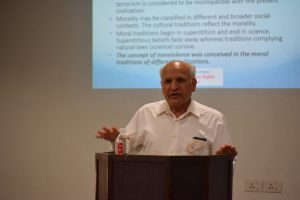Gandhinagar, February 14, 2019: GNLU organized an interactive session on the Philosophy and Practice of Non-Violence by Prof Binod Kumar, Professor at the University of Dayton, Ohio, USA.
Prof. Kumar narrated his journey from being a high school student in the remote village of Vaishali in Bihar to an engineering graduate from the Banaras Hindu University, and later a professor at the University of Dayton. His journey of research into non-violence education began during one of his visits to the city of Vaishali. Seeing the poor conditions persisting in the suburbs, his friend’s remark ‘Vaishali being the birthplace of the principle of non-violence had become so violent’, greatly invoked Prof. Binod’s curiosity regarding the concept of non-violence. He then decided to take this up as a research question and approached the President of the University of Dayton, who readily supported him in the endeavour. He then successfully completed a study on Non-violence and its causes, having come to his own conclusions and thoughts regarding non-violence.
Non-violence, according to Prof. Binod, is a principle that had to be traced back to the ‘beginning of civilization’. Addressing the various factors that contribute to the initiation, sustainability and growth of a civilization, he remarked that a there is a general impression that‘civilizations always begin with chaos and end with chaos’, which according to him is wrong. In support of his argument, he pointed to the existence of various ‘moral traditions’ in India which as envisaged through the religions always embodied the principle of non-violence. When questioned on how some religious practices like animal sacrifice may seem inherently violent, Prof. Binod explained how the original principles of Hinduism, as seen in ‘Yoga Sutras’ were always inherently non- violent, and much like other religions, only later grew on to develop violent practices. Even then, according to him, the principle of non-violence was never thrown out of India’s moral traditions, and in fact, became more prominent with the coming of ‘Nastik’ religions such as Buddhism and Jainism.
Discussing the ‘Aryan invasion’ which played a prominent role in the development of Eastern traditions, he explained the influence of the Sanskritic philosophies on the development of the non-violence philosophy, referring to texts such as the Mandokya Upanishad. The discussion then turned to non-violence as expressed in the philosophies of Mahatma Gandhi, who according to him was ‘the most prominent figure in the discourse on non-violence’. Gandhiji’s philosophy, according to him, professed an active form of the generally passive principle of non-violence’ which was based on ‘soul force’ and ‘conscience’. He characterized Mahatma Gandhi as an ‘idealist’. While his philosophies may not be followed as a blanket rule, he emphasized that non- violence must be followed in ‘all circumstances, wherever possible’. A member of the audience, at this point, also remarked on how Gandhiji himself understood the limitations of non-violence, and sometimes even ‘supported mildly violent interventions’.
Prof. Binod then addressed the problem of a ‘cycle of violence’. According to him, ‘violent actions result in an equally violent response, much like Newton’s third law, i.e. every action has an equivalent and opposite reaction”. He discussed how often it is a ‘flawed reaction to a relevant social action’ that results in the cycle of violence. Citing examples such as the rise of slavery, which according to him ‘arose out of a social need, and ultimately resulted in the exploitation of millions in African countries’, and the caste system, he connected the consequences of a flawed reaction, and emphasized on the importance of a ‘just reaction’. He made it clear that it was up to the present generation to define what a just reaction must be in order to prevent further violence.
He concluded his lecture discussing how non-violence could have been practised at the international arena between states and remarked on how it was ‘up to the future generation to find out non-violent ways to break the cycle of violence’.”
The session was organized by the GNLU Centre for Law and Society.

